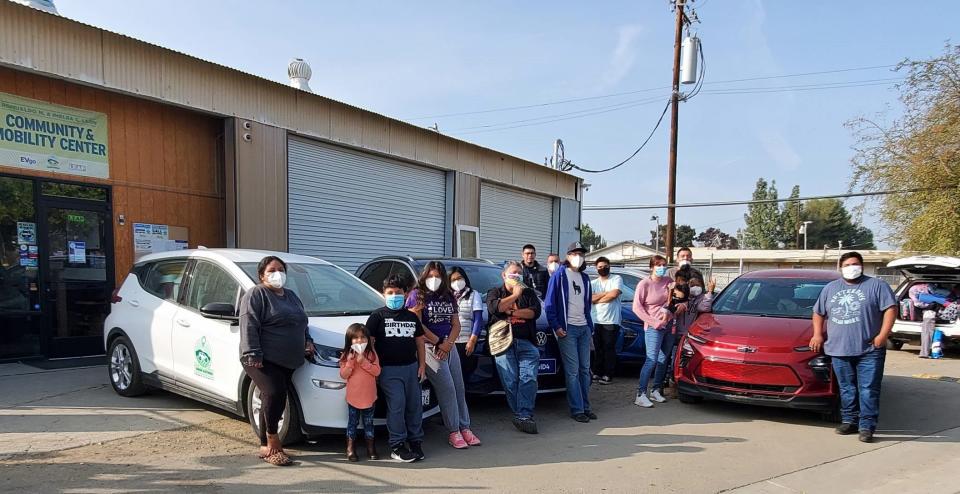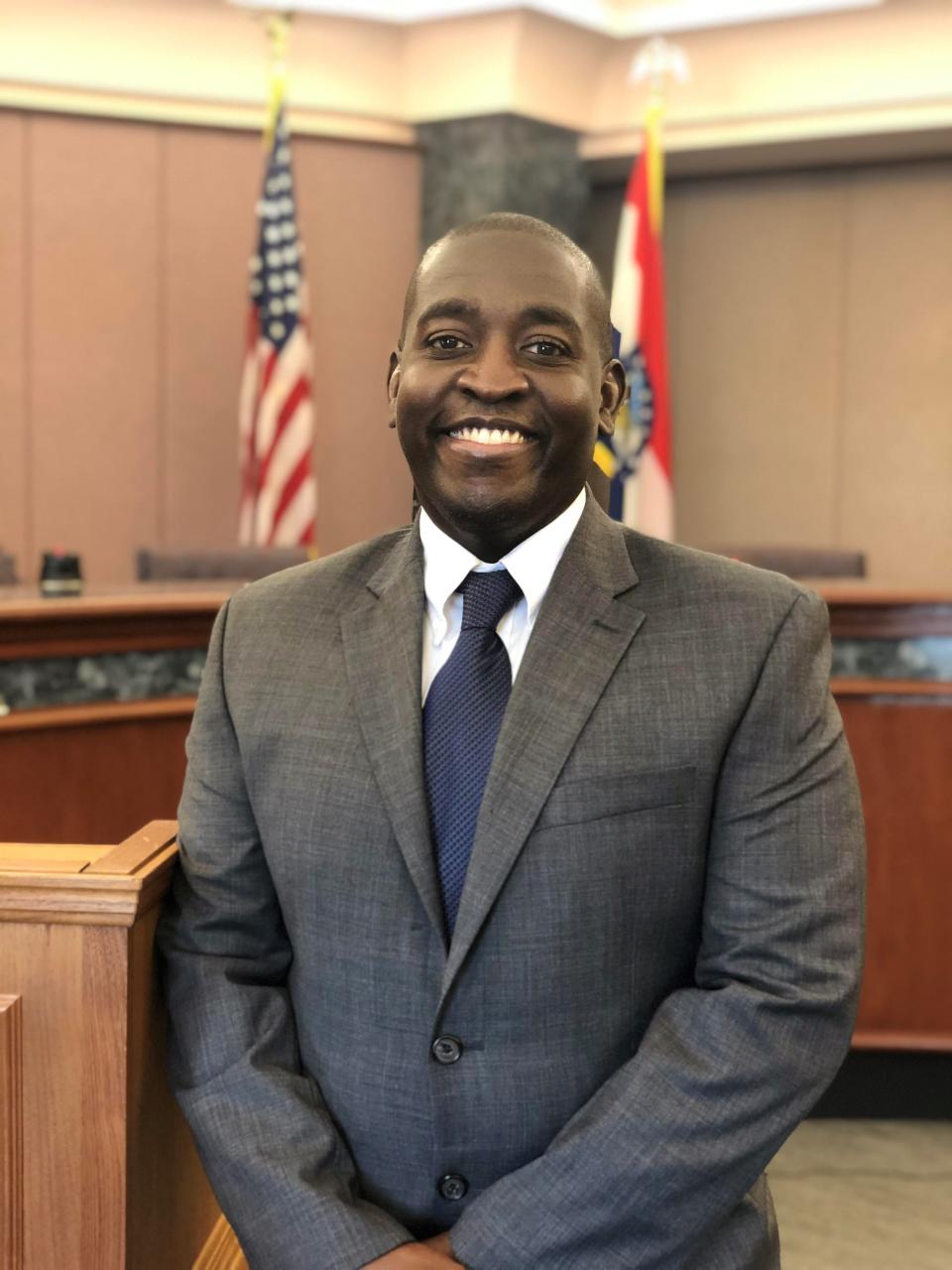Electric vehicles for everyone? Climate justice programs help people of color, low-income Americans get moving
Shana Watson sensed an immediate difference when an electric vehicle ride-share program was launched last fall at the community center where she works in north St. Louis.
"Oh, my goodness. They are so quiet. They are smoooooth. Like, you don't even know when they're started up because you don't hear the 'un, un, un,'" of a gasoline-powered engine turning over, said Watson, who serves as senior program director at the Northside Youth and Senior Service Center. "You're not getting the fumes and all of that in the air. It's clean."
The three Chevy Bolt electric vehicles provide rides for seniors and food delivery to homebound elders as part of the three-year St. Louis Vehicle Electrification Rides for Seniors (SiLVERS) program overseen by Forth, a non-profit committed to "clean and equitable transportation."
The accompanying charging stations, the power source for any electric vehicle strategy that hopes to be successful, are available for other electric vehicles to charge up when the program's Bolts aren't using them. But Watson said she hasn't seen any other vehicles charging near the community center, which is located in a predominantly Black, low-income neighborhood.
"I don't know anybody that has electric vehicles around North St. Louis City right now," she said.
EV momentum: Electric cars coming on fast: Climate worries, sinking prices put spotlight on EV sales

High gasoline prices, increased electric vehicle marketing, concerns about climate change and billions in clean transportation funds in federal infrastructure legislation are driving increased interest in electric vehicles among consumers. Low-income Americans and people of color are more likely to have been left out of the conversion conversation but a growing number of programs like the one in St. Louis are hoping to change that, with subsidies, programs and other initiatives aiming at making the vehicles more accessible to all.
Electric vehicles only constituted a little less than 4% of new car sales last year, but that's double the 2020 number. Even with that growth, electric vehicles and especially charging stations are still much more likely to be seen in wealthier areas – affluent white males made up a disproportionate number of early adopters – compared with low and moderate-income neighborhoods. The vehicles also have made less of an inroad among communities of color, activists say.
Access to electric vehicles for all demographics and incomes is necessary as a matter of fairness and justice, advocates and community members say. It also can provide immediate benefits for members of neglected communities, who tend to rack up higher vehicle mileage, the result of longer commutes due to lack of affordable housing near their jobs; the high number of lower-income people earning a living driving for ride-share services such as Uber and Lyft; and lack of necessary products and services near their homes.
In addition, low-income neighborhoods often are located near highways, ports and industrial areas responsible for increased air pollution and concerns about accompanying health risks. That means these are the neighborhoods that could most benefit from cleaner air and other environmental improvements, experts say.
"In order for us to transition to a system that has clean transportation options, (you have) to ensure that the people who are impacted first and worse, the communities impacted by poverty and pollution, are the ones at the front of the line when it comes to receiving some of these incentives," said Leslie Aguayo, program manager for climate equity for The Greenlining Institute, a non-profit pursuing racial justice.
What record EV sales mean for you: Ford CEO says automaker is sold out of electric cars like Mustang Mach-E and F-150
Cutting emissions requires everyone's participation
Finding ways to provide access and opportunity in lower-income neighborhoods is necessary to the ultimate goal of overall electrical conversion, said Jeff Allen of Forth, the Oregon-based non-profit that is working on the St. Louis SiLVERS program.
"If this only works for people who have multiple cars in a private garage and lots of flexibility, then it doesn't work. Because we have to replace all the cars," Allen said. "And the things that are barriers for historically underserved communities are barriers for everybody to some extent. It's just more severe, more obvious. If you can figure out ways to address them" there, it will help solve problems other places "and you're going to scale things up a lot faster."
At Los Angeles' Rancho San Pedro public housing project, close to the Port of Los Angeles and truck-filled freeways that aggravate air quality, residents are finding an affordable alternative to high gas prices and cleaner transportation in a pilot electric vehicle car-share program launched by the non-profit Los Angeles Cleantech Incubator in concert with the city's housing authority.
"Gas prices are crazy right now. Many people here have trucks, eight-cylinder trucks, so I think this program is amazing," said Yolanda Rodarte, a resident who serves as the electric vehicle car-share community coach at Rancho San Pedro.
Residents can drive a 2019 Nissan LEAF S or 2020 Nissan LEAF SV+ to go to doctors' appointments, buy groceries and do other errands at a rate subsidized through the program – $3 per hour, instead of $9 – while "not polluting the world," she said.
At a time when so many Americans are still learning about electric vehicles, the program, like other pilots, provides a great educational opportunity for residents to discover what the cars look like, how they plug in and charge, and charging etiquette. The biggest problem for Rodarte, who said her husband and two sons love the program's Bolts, is finding an available reservation time, a sign of the program's popularity and also the limitations of a two-vehicle pilot program serving a 478-unit complex.

Seeking to build on that, U.S. Rep. Nanette Barragán, D-California, whose district includes the Rancho San Pedro complex, last month introduced the EVs for All Act, which would provide grants to set up electric car-share services for public housing residents throughout the country.
"We need to both clean up the air overall and empower individuals who can afford a vehicle to get behind the wheel of an EV, as well as make it easier to get access to shared vehicles with electric cars like in the car-share (programs)," said Matt Petersen, president and CEO of Los Angeles Cleantech Incubator. "One of the reasons why we're investing in different pilots of EV car-share is to demonstrate models that could scale to support individuals and disadvantaged communities that are disproportionately burdened by air pollution to have access to an electric vehicle to meet their needs."
Regardless of socioeconomic level, electric vehicle education, engagement and access has to improve for communities of color, a growing population that will become an ever-increasing share of car buyers, said Terry Travis, managing partner of consultancy EVNoire and co-founder of EVHybridNoire, which he described as "the nation's largest network of diverse (electric vehicle) drivers and enthusiasts."
"As a longtime EV driver, I saw very quickly that in going to different charging stations, I didn't see folks that were reflective of my experience and so many others and so what we decided to do was to start connecting those folks who were early adopters to provide a resource" to other people of color, said Travis, who bought his first electric vehicle, a Nissan LEAF, in 2014.

He noted that Black, Latino and Native American communities are disproportionately affected by problems driven by the nation's transportation system, such as neighborhoods with poor air quality due to housing discrimination and predatory lending targeting minority car buyers.
A network of electric vehicle drivers of the same racial or ethnic background can earn trust as they convey the basic information that all newcomers need, Travis said. Electric vehicle veterans can correct misperceptions that prices are prohibitive – they're coming down as sales rise, different models are created and more used vehicles under $20,000 become available, he said. Those new to electric vehicles also will learn later models can travel more than 200 miles on a charge, a much longer range than that of earlier models, he said.
Sky-high prices on used cars: You knew used car prices were high. Here's how outrageous it has become
More charging stations needed
A significant barrier to equal access is charging stations, with a 2021 study showing disparities in access based on race and income, with Black and Latino majority neighborhoods in California having fewer stations compared with white areas. Federal infrastructure legislation includes $2.5 billion aimed at increasing charging access in rural areas and disadvantaged communities, with the U.S. government making investments in electric vehicle-related programs across the country, from Appalachia to the Mountain West.

Rural communities require attention and services, too. In Huron, California, in California's fertile San Joaquin Valley, residents are enjoying the benefits of the Green Raiteros, a ride-sharing program that features eight electric vehicles and 30 charging ports, the most per capita in the country, according to Rey Léon, Huron's mayor and founder of the program. The program's name is a play on "raite," a Spanglish slang word for "ride," he said.
The program, which allows residents to charge up at no cost supported by financial grants and fundraising, provides a viable alternative for a community made up primarily of Latino farmworkers who often have to travel far for goods and services but cannot afford to buy an electric vehicle, even with tax credits, rebates and other incentives, based on incomes of roughly $23,000 per year, said Léon.
"That investment will not be made no matter how you rationalize it, because people got to eat, pay rent and pay medical bills," said Léon.
The mayor, who founded The LEAP (Latino Equity, Advocacy & Policy) Institute to seek economic, environmental and climate justice, said the program also brings attention to a regional pollution problem that requires larger solutions.

"The air quality problem in the San Joaquin Valley, which is the region with the most contaminated air basin in the nation, makes it a logical choice to work towards the best available technologies to provide the critical service of getting people to their medical appointments to ensure the best community health prospects," Léon said.
Alternatives to car ownership, including electric vehicle rideshare programs and rentals by the hour, and different forms of electric transportation, from buses to bicycles, called e-bikes, also can provide clean transportation.
An e-bike kiosk adjacent to an Austin, Texas, housing authority complex provides an affordable transportation lifeline for low-income residents, said Sandra Winston, property manager for Rosewood Courts.
"If you need access to the grocery stores, your doctor, to work, the e-bike is the way … to access things inexpensively," she said.
She helped persuade residents that the e-bikes, made available through a collaborative effort between community-owned utility Austin Energy and the Housing Authority of the City of Austin, were meant for their use in an East Austin neighborhood that is becoming increasingly gentrified.

When the station was first installed, residents "called the office and said, 'Miss Sandra, what's all those bikes out there?' And I was like, 'Oh, that's the new e-bike and y'all are able to access them.' They said, 'For real? I thought it was for the new building across the street,'" Winston said.
Maurice Muia, a City Council member in the St. Louis suburb of Richmond Heights and a board member of Forth, the non-profit overseeing the SiLVERS rideshare program in St. Louis, said it's necessary to focus governmental and non-profit efforts on neglected areas that would otherwise constitute "a desert" when it comes to electric vehicle technology, especially when it comes to charging stations.
"If we do our work well (with) communities of color, rural communities (and) multifamily communities and that brings economic activity, it provides a sense of social justice," said Muia, an electrical engineer. "And it has environmental benefit as well."
This article originally appeared on USA TODAY: Electric vehicle access is growing priority in low-income communities

